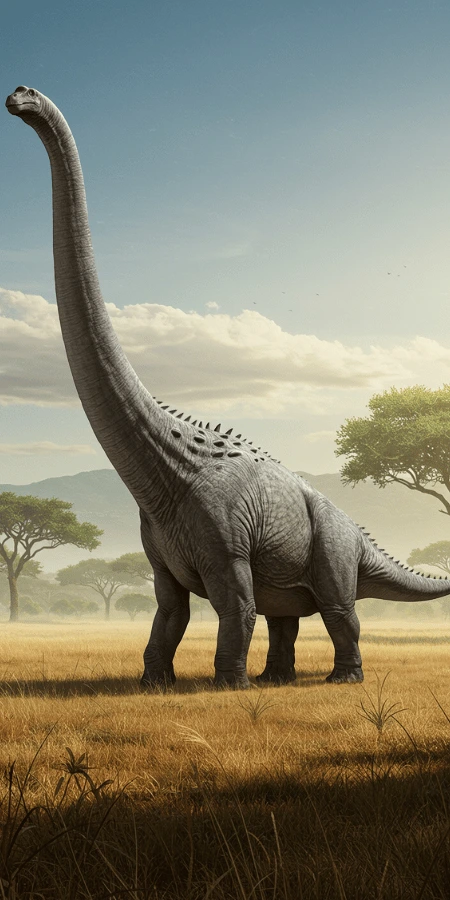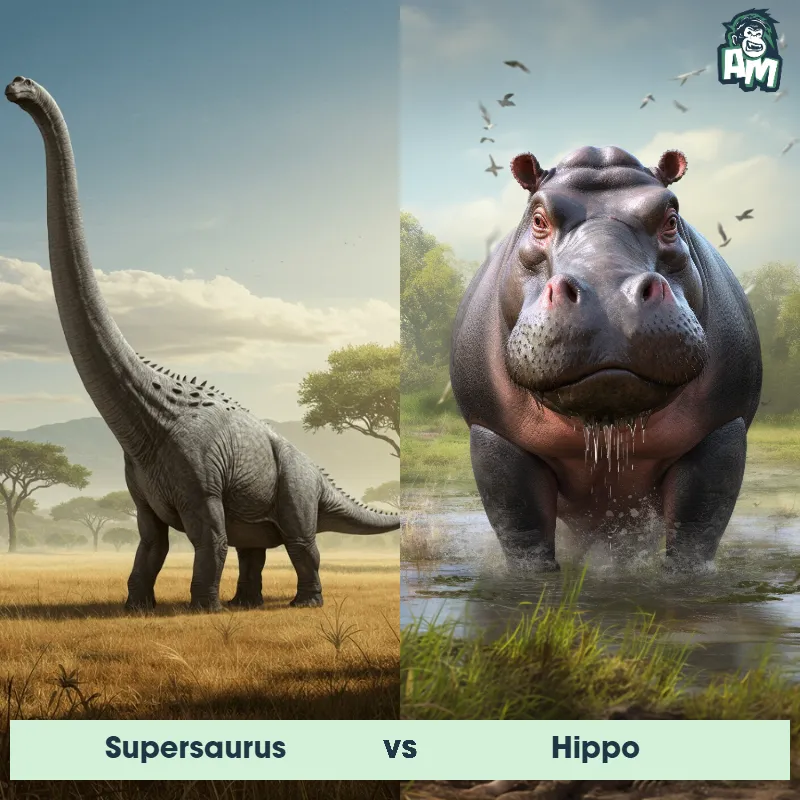The Supersaurus
The Supersaurus, one of the largest dinosaurs to have ever lived, was a massive, long-necked sauropod known for its elongated neck and tail. It stood on four sturdy legs and had a small head relative to its enormous body size. Its long neck helped it reach vegetation high off the ground, a trait that allowed it to thrive in its environment.

| Supersaurus | |
|---|---|
| Size | Up to 110 feet (33.5 meters) |
| Weight | 35-40 tons (31,750-36,287 kilograms) |
| Speed | 105-110 mph (169-177 km/h) |
| Key Strength | Size and tail strength |
| Biggest Weakness | Relatively lightweight body |
| Scientific Name | Supersaurus |
| Family | Diplodocidae |
| Habitat | Terrestrial |
| Geography | North America |
| Diet | Herbivorous |
| Lifespan | 90 years - 100 years |

The Supersaurus
The Supersaurus, one of the largest dinosaurs to have ever lived, was a massive, long-necked sauropod known for its elongated neck and tail. It stood on four sturdy legs and had a small head relative to its enormous body size. Its long neck helped it reach vegetation high off the ground, a trait that allowed it to thrive in its environment.
Fun Fact: Supersaurus is estimated to have weighed around 50 tons, making it one of the heaviest dinosaurs on record.
| Supersaurus | |
|---|---|
| Size | Up to 110 feet (33.5 meters) |
| Weight | 35-40 tons (31,750-36,287 kilograms) |
| Speed | 105-110 mph (169-177 km/h) |
| Key Strength | Size and tail strength |
| Biggest Weakness | Relatively lightweight body |
| Scientific Name | Supersaurus |
| Family | Diplodocidae |
| Habitat | Terrestrial |
| Geography | North America |
| Diet | Herbivorous |
| Lifespan | 90 years - 100 years |
Supersaurus Matchups
We use AI to simulate matchups between the Supersaurus and other animals. Our simulation considers size, strength, and natural predatory behaviors to determine the most likely outcome.

Can't find the Matchup you want?
Create Your Own MatchupSupersaurus: Diet, Predators, Aggression, and Defensive Behaviors
What did Supersaurus eat?
Supersaurus were herbivores, meaning they primarily ate plants. Their diet likely consisted of leaves, ferns, and other vegetation found in their environment. They had long necks that allowed them to reach high foliage.
Did Supersaurus have any predators?
As one of the largest dinosaurs to have ever lived, Supersaurus likely did not have many predators. However, smaller predatory dinosaurs may have posed a threat to their offspring or individuals that were sick or injured. They may have also faced competition over food sources with other large herbivores.
Were Supersaurus aggressive?
Supersaurus are believed to have been relatively peaceful creatures. They likely spent their days feeding on plants and moving in herds for protection. However, like most animals, they may have become aggressive when threatened or during mating season.
Did Supersaurus fight?
While there is limited evidence to suggest that Supersaurus engaged in physical fights, they may have used their size and strength to establish dominance or protect themselves from predators. It is possible that they would have used their long tails or powerful legs to defend themselves if necessary.
How did Supersaurus defend themselves?
Supersaurus likely relied on their immense size and strength as a means of defense. Their long necks and tails may have been used to ward off potential threats, while their herding behavior provided safety in numbers. Additionally, their thick skin and large body mass could have acted as natural armor against attacks.
What was Supersaurus's biggest weakness in a fight?
Despite their size and strength, the sheer size of Supersaurus may have been a disadvantage in a fight. Their massive bodies made them slower and less agile than smaller predators or rivals, potentially leaving them vulnerable to quicker and more maneuverable opponents. Additionally, their long necks and tails could have been targeted by attackers aiming to disable them in battle.
Fun Fact: Despite its massive size, Supersaurus was a herbivore, feeding on plants to sustain its enormous body.
Fun Fact: The name "Supersaurus" means "super lizard" in Latin, reflecting its status as one of the largest dinosaurs of all time.











